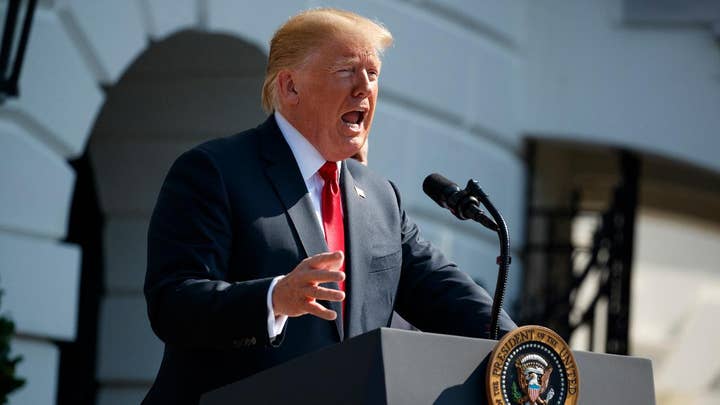Trump's Supreme Court pick will need McConnell for confirmation: Gregg Jarrett
Fox legal analyst Gregg Jarrett says Senate Majority Leader Mitch McConnell will be able to influence the confirmation of any of President Trump’s Supreme Court candidates.
You may recall when Senate Majority Leader Mitch McConnell touched one of the few sacrosanct grails on Capitol Hill.
“As you may have heard, I have canceled the August recess. We have a lot of important work to do as a result of unprecedented obstruction,” he declared.
For weeks, the Kentucky Republican suggested that reporters keep their travel plans “flexible” and purchase “refundable tickets.”
So what about cancelling that August recess?
Kinda-sorta. But not really.
The Senate cut town mid-afternoon on Aug. 1, scrapping a scheduled session for Aug. 2. McConnell suggested two weeks ago that the Senate would take an abbreviated break for the first full week of August. But senators would return on Aug. 14 for a noon vote. Well, Wednesday night, McConnell dashed that plan, too. The Senate won’t meet in earnest until Wednesday, Aug. 15 at noon. There won’t be a vote until late Wednesday afternoon. This means the Senate truly won’t tackle much at all until Thursday, Aug. 16 – at the earliest.
Then the question becomes, does the Senate really accomplish much until the following Monday or Tuesday?
To be fair, the Senate’s really stepped up its game of late. Much of that dispatch can be traced back to none other than President Trump.
Trump lit a fire under the Senate to start moving annual spending bills well ahead of the government’s new fiscal year, Oct. 1. Trump excoriated lawmakers in March when he reluctantly signed a $1.3 trillion omnibus spending bill to avoid a shutdown. The measure glommed all 12 of the annual spending bills into a solitary piece of legislation. Trump warned lawmakers he wouldn’t sign one of those packages again. He also implored McConnell to cancel the August recess.
So ...
The Senate toiled in a bipartisan fashion, attempting to avoid an omnibus that would again draw the president’s ire and trigger a government shutdown.
This is the “Volkswagen” approach to federal budgeting.
Rather than an “omnibus,” senators prepared “mini-buses.” In congressional-speak, a “mini-bus” is a spending measure which rolls several bills into one – but not all 12. The first mini-bus contained three bills. The Senate wrapped that up in late July. On Aug. 1, the Senate bundled the Agriculture, Interior, Transportation/Housing and Financial Services spending measure into a singular parcel. The Senate approved that 92-6.
This comes even as Trump threatens a government shutdown over a border wall.
“We are working in a remarkably smooth, bipartisan way,” said Senate Minority Leader Chuck Schumer, D-N.Y. “We hope that we will continue to work together and not let any outside forces mess that up – not to mention any names.”
The Senate also approved a four-month extension of flood insurance and passed the annual defense policy bill, 87-10.
And then senators hit the exits. They even canned a big hearing about the role of NATO. Senators scheduled the hearing to evaluate the status of the alliance amid Trump’s rocky meeting with leaders of other NATO countries in Brussels.
The Senate aims to tackle a third mini-bus later this month. This one funds the Pentagon (the largest of the 12 spending bills, accounting for more than half of all spending not devoted toward entitlements) and the measure for the Departments of Labor and Health & Human Services.
But for now, everyone’s gone. The House ain’t coming back until Sept. 4.
So the August recess is on. Kinda-sorta.
But these days, Congress is never really out of session.
Trump took to the stump for the midterms. The president flew to Pennsylvania to campaign for one of his original supporters in Congress, Rep. Lou Barletta, R-Pa. Barletta’s challenging Sen. Bob Casey, D-Pa., this fall. Trump then heads to Ohio to rally for Republican House candidate Troy Balderson. Balderson faces Democrat Danny O’Connor Aug. 7 in a special election to succeed former Rep. Pat Tiberi, R-Ohio, who resigned. The seat’s been in GOP hands for decades. Handicappers believe this contest could portend which direction the political winds will blow this fall.
That said, special elections are just that: special. It’s hard to glean clues about the state of the electorate in an August special election for a truncated term.
When McConnell announced he was “cancelling” the August recess, Schumer immediately responded that Democrats would focus on health care. They’re pushing a vote on “junk” health care plans and pre-existing conditions. But Democrats are burning most of their energy on documents tied to Supreme Court nominee Brett Kavanaugh.
“I question the sincerity of the demands of more documents,” protested Senate Judiciary Committee Chairman Chuck Grassley, R-Iowa. “What more do they need to vote no?”
Grassley won’t schedule a confirmation hearing until September. A vote on Kavanaugh could slip into October. No one is certain if he has the votes.
Sens. Joe Manchin, D-W.Va., Heidi Heitkamp, D-N.D., and Joe Donnelly, D-Ind., are the most-intriguing votes to watch in Kavanaugh’s confirmation fight. All three face competitive re-election bids this year. The trio also voted to confirm Justice Neil Gorsuch. On the right, most are studying how Sens. Lisa Murkowski, R-Alaska, and Susan Collins, R-Maine, may vote. With Sen. John McCain, R-Ariz., ailing, the Senate effectively favors Republicans by a single vote, 50-49. That’s why the person to watch could be Sen. Doug Jones, D-Ala.
Jones wasn’t a senator last year when his colleagues confirmed Gorsuch. No other Democratic senator represents a state as conservative as Alabama.
Jones is circumspect about Kavanaugh.
“We’re not here to be a rubber-stamp for the president,” said Jones, noting he doesn’t feel pressure of perhaps being the swing vote that could make or break Kavanaugh.
“I’m prepared to vote for a conservative justice,” said Jones. “The question is whether I’m prepared to vote for this justice?”
No vote in August on Kavanaugh. But these are the issues coursing through Capitol Hill when lawmakers are on recess.
Kinda-sorta.
Capitol Attitude is a weekly column written by members of the Fox News Capitol Hill team. Their articles take you inside the halls of Congress, and cover the spectrum of policy issues being introduced, debated and voted on there.














































